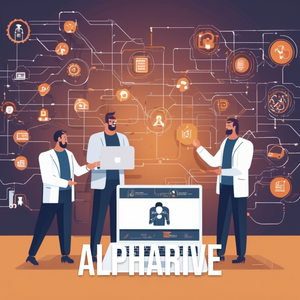Supply Chain Software Development for Tomorrow: AI-Driven, Predictive, and Scalable
 Alex Grave
14 Oct, 2025
9 mins read
21
Alex Grave
14 Oct, 2025
9 mins read
21

Let’s face it—supply chains are no longer just about moving goods from A to B. They’re ecosystems powered by data, automation, and real-time decisions. And the glue holding all that together? Smart, scalable software.
As global markets grow more unpredictable and customer expectations skyrocket, traditional supply chain systems just can’t keep up. That’s where modern supply chain software development steps in—building digital systems that think, adapt, and evolve.
The Real Shift: From Reactive to Predictive Supply Chains
In the past, supply chains reacted to problems. A delay happened, and teams scrambled to fix it. But in today’s hyperconnected world, reacting isn’t enough—you need to predict what’s coming.
AI and machine learning are making this possible. Imagine a system that doesn’t just track inventory but forecasts demand spikes, identifies potential bottlenecks before they happen, and even suggests optimal delivery routes in real time. That’s what predictive supply chain software is doing right now for top global players.
This shift means less guesswork, faster decisions, and far more control across the entire network.
Why Businesses Are Investing Heavily in Supply Chain Software Development
Let’s break it down. The reason so many companies are pouring resources into supply chain software development comes down to five core advantages:
- Visibility at Every Level – With IoT sensors and cloud-based dashboards, teams can track shipments, materials, and performance metrics from anywhere. No blind spots, no surprises.
- Automation That Actually Works – From order processing to warehouse robotics, automation is freeing human teams from repetitive tasks. The result: fewer errors and faster turnaround times.
- Data-Driven Decision Making – Every process generates data. The right software turns that raw data into insights—identifying inefficiencies, predicting trends, and driving better business outcomes.
- Cost Optimization – Smart algorithms analyze purchasing, transportation, and inventory data to cut unnecessary costs without affecting quality or delivery times.
- Scalability for Growth – As your business grows, scalable supply chain software adapts—adding new partners, warehouses, or regions without forcing a total system overhaul.
That’s not theory; it’s what’s happening right now in companies that have embraced AI-powered supply chain development.
The AI Factor: Turning Data Into Decisions
Here’s the thing—AI isn’t replacing people. It’s amplifying them. In supply chain systems, AI helps identify inefficiencies humans might miss. It studies patterns across suppliers, warehouses, and shipping routes, then recommends smarter ways to operate.
For example, AI supply chain software can:
- Predict demand shifts based on seasonality or regional trends
- Flag potential supplier risks using past performance data
- Optimize truck routes using real-time traffic and weather updates
- Manage energy consumption in warehouses for cost and sustainability gains
It’s not just efficiency—it’s foresight. Businesses using AI in supply chain management are reporting faster delivery times, lower costs, and higher customer satisfaction rates.
Custom Supply Chain Software: Why One Size Doesn’t Fit All
Every supply chain has its own complexity. A retail giant’s logistics network looks nothing like a pharmaceutical company’s or a food delivery startup’s. That’s why custom supply chain software development is becoming the norm.
Instead of relying on generic systems, custom-built solutions are tailored around a company’s workflow, regulations, and data ecosystem. That means:
- Smooth integration with existing ERP or CRM systems
- Industry-specific compliance features
- Custom dashboards for different departments
- Flexible modules that scale as the business expands
This flexibility is key to staying competitive. The world’s best-performing supply chains are no longer the biggest—they’re the smartest and most adaptable.
The Rise of AI-Powered Supply Chain Platforms
Let’s talk about the next big leap—AI-powered platforms that connect every part of the supply chain into one digital command center. These platforms don’t just collect data; they understand it.
They use predictive analytics, automation, and digital twins to create real-time simulations of the entire network. Managers can test scenarios (“What if a supplier shuts down?â€) and instantly see the outcome before taking action.
This kind of smart SCM software development is redefining what’s possible. Businesses now have the ability to anticipate problems and act before customers even notice.
Security and Sustainability: The Twin Priorities
Today’s supply chain systems don’t just have to be fast—they have to be safe and responsible. Cyber threats and data breaches are real concerns, especially when sensitive data flows between multiple vendors and systems.
Modern supply chain software development companies are integrating blockchain and zero-trust architectures to protect that data. Blockchain ensures transparency and authenticity across every transaction, reducing fraud and building trust among partners.
On the sustainability front, smart systems help companies reduce waste, track carbon emissions, and optimize transportation for lower fuel consumption. This isn’t just about compliance—it’s becoming a competitive advantage.
Looking Ahead: The Future of Supply Chain Development
Here’s what’s clear—the next generation of supply chain systems won’t be optional. They’ll be essential. AI, IoT, and cloud computing are converging to create a fully connected ecosystem where every piece of data matters.
Expect more:
- Real-time collaboration between humans and intelligent systems
- Predictive logistics, not reactive responses
- Autonomous systems for warehouse and fleet management
- Integrated analytics that guide strategic planning
And the companies that adapt now? They’ll be the ones shaping how global trade operates in the next decade.
Final Thoughts
The global market is changing fast, and so is the way we move goods, track data, and serve customers. Businesses that invest in supply chain software development today are setting themselves up for resilience and agility tomorrow.
If you’re exploring smarter, scalable, and AI-driven solutions, partnering with a supply chain software development company that understands your ecosystem is the best place to start. The future of logistics isn’t about reacting—it’s about anticipating. And the right software makes that possible.
Written By:
Alex Grave



Hotels at your convenience
Now choose your stay according to your preference. From finding a place for your dream destination or a mere weekend getaway to business accommodations or brief stay, we have got you covered. Explore hotels as per your mood.


